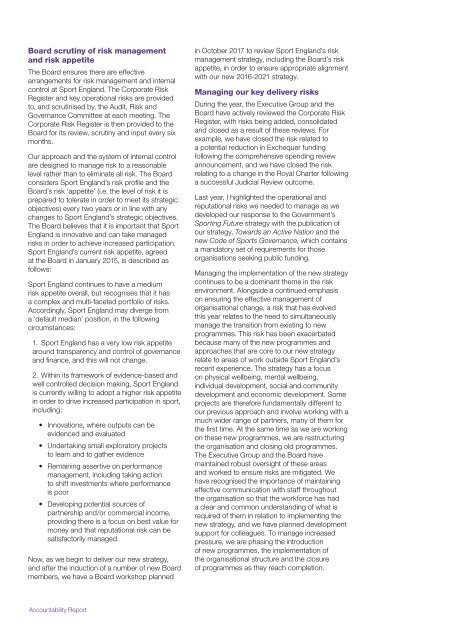WEB_SportEngland_AR_2016-17
You also want an ePaper? Increase the reach of your titles
YUMPU automatically turns print PDFs into web optimized ePapers that Google loves.
Board scrutiny of risk management<br />
and risk appetite<br />
The Board ensures there are effective<br />
arrangements for risk management and internal<br />
control at Sport England. The Corporate Risk<br />
Register and key operational risks are provided<br />
to, and scrutinised by, the Audit, Risk and<br />
Governance Committee at each meeting. The<br />
Corporate Risk Register is then provided to the<br />
Board for its review, scrutiny and input every six<br />
months.<br />
Our approach and the system of internal control<br />
are designed to manage risk to a reasonable<br />
level rather than to eliminate all risk. The Board<br />
considers Sport England’s risk profile and the<br />
Board’s risk ‘appetite’ (i.e. the level of risk it is<br />
prepared to tolerate in order to meet its strategic<br />
objectives) every two years or in line with any<br />
changes to Sport England’s strategic objectives.<br />
The Board believes that it is important that Sport<br />
England is innovative and can take managed<br />
risks in order to achieve increased participation.<br />
Sport England’s current risk appetite, agreed<br />
at the Board in January 2015, is described as<br />
follows:<br />
Sport England continues to have a medium<br />
risk appetite overall, but recognises that it has<br />
a complex and multi-faceted portfolio of risks.<br />
Accordingly, Sport England may diverge from<br />
a ‘default median’ position, in the following<br />
circumstances:<br />
1. Sport England has a very low risk appetite<br />
around transparency and control of governance<br />
and finance, and this will not change.<br />
2. Within its framework of evidence-based and<br />
well controlled decision making, Sport England<br />
is currently willing to adopt a higher risk appetite<br />
in order to drive increased participation in sport,<br />
including:<br />
• Innovations, where outputs can be<br />
evidenced and evaluated<br />
• Undertaking small exploratory projects<br />
to learn and to gather evidence<br />
• Remaining assertive on performance<br />
management, including taking action<br />
to shift investments where performance<br />
is poor<br />
• Developing potential sources of<br />
partnership and/or commercial income,<br />
providing there is a focus on best value for<br />
money and that reputational risk can be<br />
satisfactorily managed.<br />
Now, as we begin to deliver our new strategy,<br />
and after the induction of a number of new Board<br />
members, we have a Board workshop planned<br />
in October 20<strong>17</strong> to review Sport England’s risk<br />
management strategy, including the Board’s risk<br />
appetite, in order to ensure appropriate alignment<br />
with our new <strong>2016</strong>-2021 strategy.<br />
Managing our key delivery risks<br />
During the year, the Executive Group and the<br />
Board have actively reviewed the Corporate Risk<br />
Register, with risks being added, consolidated<br />
and closed as a result of these reviews. For<br />
example, we have closed the risk related to<br />
a potential reduction in Exchequer funding<br />
following the comprehensive spending review<br />
announcement, and we have closed the risk<br />
relating to a change in the Royal Charter following<br />
a successful Judicial Review outcome.<br />
Last year, I highlighted the operational and<br />
reputational risks we needed to manage as we<br />
developed our response to the Government’s<br />
Sporting Future strategy with the publication of<br />
our strategy, Towards an Active Nation and the<br />
new Code of Sports Governance, which contains<br />
a mandatory set of requirements for those<br />
organisations seeking public funding.<br />
Managing the implementation of the new strategy<br />
continues to be a dominant theme in the risk<br />
environment. Alongside a continued emphasis<br />
on ensuring the effective management of<br />
organisational change, a risk that has evolved<br />
this year relates to the need to simultaneously<br />
manage the transition from existing to new<br />
programmes. This risk has been exacerbated<br />
because many of the new programmes and<br />
approaches that are core to our new strategy<br />
relate to areas of work outside Sport England’s<br />
recent experience. The strategy has a focus<br />
on physical wellbeing, mental wellbeing,<br />
individual development, social and community<br />
development and economic development. Some<br />
projects are therefore fundamentally different to<br />
our previous approach and involve working with a<br />
much wider range of partners, many of them for<br />
the first time. At the same time as we are working<br />
on these new programmes, we are restructuring<br />
the organisation and closing old programmes.<br />
The Executive Group and the Board have<br />
maintained robust oversight of these areas<br />
and worked to ensure risks are mitigated. We<br />
have recognised the importance of maintaining<br />
effective communication with staff throughout<br />
the organisation so that the workforce has had<br />
a clear and common understanding of what is<br />
required of them in relation to implementing the<br />
new strategy, and we have planned development<br />
support for colleagues. To manage increased<br />
pressure, we are phasing the introduction<br />
of new programmes, the implementation of<br />
the organisational structure and the closure<br />
of programmes as they reach completion.<br />
Accountability Report








